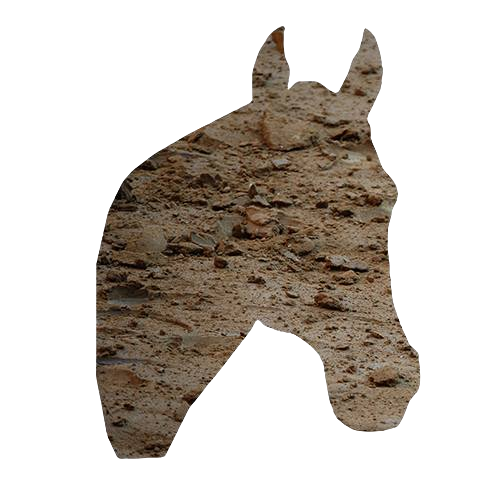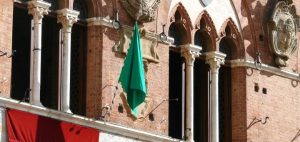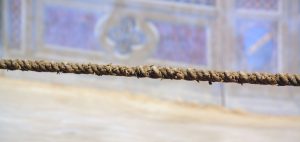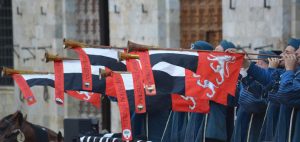www.thepalio.eu - dal Belgio con amore
The rules for the allocation of horses.
Having previously discussed the rules regarding the presentation of the horses and battery, it is now time to discuss the allocation, as well as the rules that the contrade must respect once they have been assigned a horse.
Rules 45 and 46 determine the choice of horses. A meeting is held in the Palazzo Pubblico where the mayor and a secretary, the Deputati della festa, the municipal veterinarian (who is responsible for giving technical advice on each horse), the mossiere (who can only give information and technical opinions ) and of course the 10 captains. The latter are the only ones with voting rights.
In accordance with Rule 45, the owner of one of the horses under discussion may be requested to be excluded from the meeting around that horse. The horses are discussed individually in the order of presentation and, if necessary, a vote is taken, which can be done in secret upon request. Once the horses have been chosen, they are given a new number from 1 to 10.
At the end of the meeting, the non-chosen horses are taken one by one to the horse carts in Piazza del Mercato. The ten chosen horses therefore receive a new number on the bridle and are led into 10 boxes provided for this purpose in front of the town hall. The way in which the assegnazione takes place is described in article 48. The draw takes place on a specially equipped and raised stage so that everything is clearly visible to the public. The lucky charms, dressed in the colors of the neighbourhoods, take their places in front of the stage. This has only taken place in a public space since 1936. Previously, the ceremony was held in the Cortile del Podestà. Only a few were present here. (the city council, the captains and the stablemen). The contradaioli did not know which horse they had drawn until it left the town hall with their stableman.
Article 49 regulates everything that happens to the horse after being assigned to a contrada. This way it is transferred to the relevant district. It acquires the right to use it only for the purposes and in the ways specified in these regulations. They take on the obligation to care for the horse. One must provide a stable and food. However, the Contrada remains completely exempt from any liability for what may happen to the horse during the performance and as a result of all proves and the Palio. In addition, also for any form of force majeure that could occur while the horse has been transferred to the district.
On the other hand, however, a contrada could be disbarred for a period of one to three years should they intentionally injure or mistreat the horse. The contrade are required to participate in the prove and the palio with the horse assigned to them. (article 50.1) . No one can claim its fading for any reason. Should the horse injure itself or die worse, the contrada is obliged to participate in the Corteo Storico; the right to participate will then lapse. A district that replaces the assigned horse risks a 10-year ban for every Palio, including the Straordinari. In addition, those responsible for the district will be prosecuted criminally.
Furthermore, the Contrada that has changed or replaced the horse is not allowed to participate in the Palio under any circumstances. Finally, Article 83 reminds “that the Contrade, for whatever reason (except if physical problems are diagnosed by the veterinarian) may not withdraw their horse from the Palio. The contrada who would do this will be immediately disqualified from participating in the next two Palios. We remember the Palio della Pace in 1945 where Tartuca decided to withdraw in protest against Mossiere Pini’s decision. The race was ridden with 9 districts. Initially, Tartuca was sentenced, but a little later the mayor decided to withdraw it because the end of the war had to be celebrated and to bring peace to the city.



